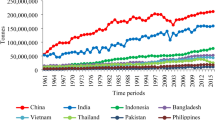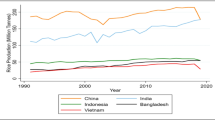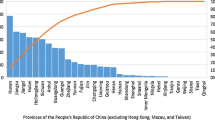Abstract
This study is the first attempt to examine the effects of changing climate and financial development on rice cultivation in the context of agrarian economy like Thailand from 1969 to 2016. The current study also uses other important variables, such as cultivated area, organic fertilizers usage, and rural labor to determine the long-term connection amid variables. In this study, we applied several econometric techniques, for instance the autoregressive distributive lag–error correction model (ARDL–ECM), vector error correction model (VECM), impulse response functions (IMFs), and variance decomposition (VARD) method to estimate the most reliable and robust outcomes. The empirical results showed that in the long- and short-run, there is a reduction in rice cultivation as temperature increase. The carbon dioxide (CO2) positively affects rice cultivation in the long-run, while this association is negative in the short-run. The findings further revealed that in the long- and short-run, domestic credit provided by the financial sector significantly positive improved rice cultivation, while domestic credit to private sector by banks negatively affects rice cultivation. The important input factors, including cultivated area, organic fertilizers usage, and rural labor significantly positive contributed toward rice cultivation in the long- and short-run. The calculated long-run causal connection of all the studied variables with rice cultivation is validated. The estimated short-run causal relationship is unidirectional among temperature, CO2 emissions, financial development, rural labor, and rice cultivation. In addition, our outcomes are robust and also verified by IMFs and VARD method. The study offers some important policy suggestions to increase rice production with the help of sound and well-developed financial systems and climate controls.





Similar content being viewed by others
Data availability
The data will be available on request.
References
Abbas S (2022) Climate change and major crop production: evidence from Pakistan. Environ Sci Pollut Res 29:5406–5414. https://doi.org/10.1007/s11356-021-16041-4
Abbas S, Mayo ZA (2021) Impact of temperature and rainfall on rice production in Punjab, Pakistan. Environ Dev Sustain 23:1706–1728
Afrin S, Haider MZ, Islam MS (2017) Impact of financial inclusion on technical efficiency of paddy farmers in Bangladesh. Agricultural Finance Review 77(4):484–505. https://doi.org/10.1108/AFR-06-2016-0058
Ahmad S, Tariq M, Hussain T, Abbas Q, Elham H, Haider I, Li X (2020) Does Chinese FDI, climate change, and CO2 emissions stimulate agricultural productivity? An Empirical Evidence from Pakistan Sustainability 12:7485
Ahsan F, Chandio AA, Fang W (2020) Climate change impacts on cereal crops production in Pakistan: Evidence from cointegration analysis. International Journal of Climate Change Strategies and Management 12(2):257–269. https://doi.org/10.1108/IJCCSM-04-2019-0020
Ali E (2021) Farm Households’ Adoption of Climate-smart Practices in Subsistence Agriculture: Evidence from Northern Togo. Environmental Management 67:949–962. https://doi.org/10.1007/s00267-021-01436-3
Anetor F, Ogbechie C, Kelikume I, Ikpesu F (2016): Credit supply and agricultural production in Nigeria: a vector autoregressive (VAR) approach. Journal of Economics and Sustainable Development 7
Arunrat N, Pumijumnong N (2015) The preliminary study of climate change impact on rice production and economic in Thailand. Asian Soc Sci 11:275
Arunrat N, Wang C, Pumijumnong N, Sereenonchai S, Cai W (2017) Farmers’ intention and decision to adapt to climate change: A case study in the Yom and Nan basins, Phichit province of Thailand. J Clean Prod 143:672–685
Attiaoui I, Boufateh T (2019) Impacts of climate change on cereal farming in Tunisia: a panel ARDL–PMG approach. Environ Sci Pollut Res 26:13334–13345
Babel MS, Agarwal A, Swain DK, Herath S (2011) Evaluation of climate change impacts and adaptation measures for rice cultivation in Northeast Thailand. Climate Res 46:137–146
Bashir MK, Mehmood Y (2010) Institutional credit and rice productivity: a case study of District Lahore. Pakistan. China Agricultural Economic Review 2(4):412–419. https://doi.org/10.1108/17561371011097722
Bhardwaj M, Kumar P, Kumar S, Dagar V, Kumar A (2022) A district-level analysis for measuring the effects of climate change on production of agricultural crops, i.e., wheat and paddy: evidence from India. Environ Sci Pollut Res. https://doi.org/10.1007/s11356-021-17994-2
Bogan VL, Turvey CG, Salazar G (2015) The elasticity of demand for microcredit: evidence from Latin America. Development Policy Review 33:725–757
Boonwichai S, Shrestha S, Babel MS, Weesakul S, Datta A (2019) Evaluation of climate change impacts and adaptation strategies on rainfed rice production in Songkhram River Basin, Thailand. Sci Total Environ 652:189–201
Challinor A, Wheeler T, Garforth C, Craufurd P, Kassam A (2007) Assessing the vulnerability of food crop systems in Africa to climate change. Clim Change 83:381–399
Chandio AA, Jiang Y, Wei F, Guangshun X (2018) Effects of agricultural credit on wheat productivity of small farms in Sindh. Pakistan. Agricultural Finance Review 78(5):592–610. https://doi.org/10.1108/AFR-02-2017-0010
Chandio AA, Jiang Y, Rauf A, Ahmad F, Amin W, Shehzad K (2020a) Assessment of formal credit and climate change impact on agricultural production in Pakistan: A time series ARDL modeling approach. Sustainability 12:5241
Chandio AA, Ozturk I, Akram W, Ahmad F, Mirani AA (2020b) Empirical analysis of climate change factors affecting cereal yield: evidence from Turkey. Environ Sci Pollut Res 27:11944–11957
Chandio AA, Jiang Y, Ahmad F, Adhikari S, Ain QU (2021) Assessing the impacts of climatic and technological factors on rice production: Empirical evidence from Nepal. Technology in Society 66:101607
Chandio AA, Jiang Y, Akram W, Adeel S, Irfan M, Jan I (2021) Addressing the effect of climate change in the framework of financial and technological development on cereal production in Pakistan. Journal of Cleaner Production 288:125637
Chandio AA, Shah MI, Sethi N, Mushtaq Z (2022) Assessing the effect of climate change and financial development on agricultural production in ASEAN-4: the role of renewable energy, institutional quality, and human capital as moderators. Environ Sci Pollut Res 29:13211–13225. https://doi.org/10.1007/s11356-021-16670-9
Chiarawipa R, SDOODEE KTS (2020) Assessing impact of weather variability and changing climate on oil-palm yield in major growing regions of southern Thailand. Journal of Agrometeorology 22:274–284
Chinvanno S, Boulidam S, Inthavong T, Souvannalath S, Lersupavithnapa B, Kerdsub V, Thuan N (2013): Climate risks and rice farming in the lower Mekong river basin. Climate Change and Vulnerability and Adaptation: Two Volume Set 333
Churchill SA, Marisetty VB (2020) Financial inclusion and poverty: a tale of forty-five thousand households. Appl Econ 52:1777–1788
FAO (2013): Edible Insects. Future prospects for food and feed security, food and agriculture organization of the United Nations, available at:https://doi.org/10.1017/CBO9781107415324.004
FAO (2017): The Future of Food and Agriculture: trends and challenges, food and agriculture Organization of the United Nations, Rome, available at: http://www.fao.org/publications/fofa
Felkner J, Tazhibayeva K, Townsend R (2009) Impact of climate change on rice production in Thailand. American Economic Review 99:205–210
Gul A, Chandio AA, Siyal SA, Rehman A, Xiumin W (2021) How climate change is impacting the major yield crops of Pakistan? an exploration from long- and short-run estimation. Environ Sci Pollut Res. https://doi.org/10.1007/s11356-021-17579-z
Gul A, Xiumin W, Chandio AA, Rehman A, Siyal SA, Asare I (2022) Tracking the effect of climatic and non-climatic elements on rice production in Pakistan using the ARDL approach. Environ Sci Pollut Res. https://doi.org/10.1007/s11356-022-18541-3
Guntukula R (2020) Assessing the impact of climate change on Indian agriculture: evidence from major crop yields. Journal of Public Affairs 20:e2040
Haldar A, Sethi N (2022) Environmental effects of Information and communication technology-exploring the roles of renewable energy, innovation, trade and financial development. Renewable and Sustainable Energy Reviews 153:111754
Halliru A, Loganathan N, Sethi N, Hassan A (2020) FDI inflows, energy consumption and economic growth: testing the pollution haven hypothesis for ECOWAS countries. Int J Green Economics 14:327–348
Hamid F, Yazdanpanah M, Baradaran M, Khalilimoghadam B, Azadi H (2021) Factors affecting farmers’ behavior in using nitrogen fertilizers: society vs. farmers’ valuation in southwest Iran. J Environ Planning Manage 64:1886–1908
IPCC (2014): “Summary for policymakers.”, In: Climate Change 2014: Impacts, adaptation, and vulnerability. Part A: global and sectoral aspects. Contribution of Working Group II to the Fifth Assessment Report of the Intergovernmental Panel on Climate Change, Vol. 111, Cambridge University Press, Cambridge, United Kingdom and New York, NY, USA, pp. 1–32
Islam ARMT, Shill BK, Salam R, Siddik MNA, Patwary MA (2021) Insight into farmers’ agricultural adaptive strategy to climate change in northern Bangladesh. Environ Dev Sustain 23:2439–2464. https://doi.org/10.1007/s10668-020-00681-6
Issahaku G, Abdulai A (2020) Can farm households improve food and nutrition security through adoption of climate-smart practices? Empirical evidence from Northern Ghana. Appl Econ Perspect Policy 42:559–579
Johansen S (1992) Determination of cointegration rank in the presence of a linear trend. Oxford Bull Econ Stat 54:383–397
Khanal U, Wilson C, Hoang V-N, Lee B (2018) Farmers’ adaptation to climate change, its determinants and impacts on rice yield in Nepal. Ecol Econ 144:139–147
Kumar P, Sahu NC, Kumar S, Ansari MA (2021) Impact of climate change on cereal production: evidence from lower-middle-income countries. Environ Sci Pollut Res 28:51597–51611. https://doi.org/10.1007/s11356-021-14373-9
Limantol AM, Keith BE, Azabre BA, Lennartz B (2016) Farmers’ perception and adaptation practice to climate variability and change: a case study of the Vea catchment in Ghana. Springerplus 5:1–38
Lucas RE Jr (1988) On the mechanics of economic development. J Monet Econ 22:3–42
Mainuddin M, Kirby M, Hoanh CT (2012) Water productivity responses and adaptation to climate change in the lower Mekong basin. Water International 37:53–74
Mainuddin M, Kirby M, Hoanh CT (2013) Impact of climate change on rainfed rice and options for adaptation in the lower Mekong Basin. Nat Hazards 66:905–938
Muhammad S, Lean HH (2011): Does financial development increase energy consumption? role of industrialization and urbanization in Tunisia
OAE (2018): Office of Agricultural Economics, M. of A. and C. in T. (2018), “The situation and trends of agricultural products of Thailand in 2018”
Ojo T, Baiyegunhi L (2020) Impact of climate change adaptation strategies on rice productivity in South-west, Nigeria: An endogeneity corrected stochastic frontier model. Science of The Total Environment 745:141151
Okodua H, Ewetan O (2013) Econometric analysis of exports and economic growth in Nigeria. Journal of Business Management and Applied Economics 2:1–14
Okwala T, Shrestha S, Ghimire S, Mohanasundaram S, Datta A (2020) Assessment of climate change impacts on water balance and hydrological extremes in Bang Pakong-Prachin Buri river basin, Thailand. Environmental research 186:109544
Omoregie OK, Ikpesu F, Okpe AE (2018) Credit supply and rice output in Nigeria: empirical insight from vector error correction model approach. Int J Econ Financ Issues 8:68–74
Ozdemir D (2022) The impact of climate change on agricultural productivity in Asian countries: a heterogeneous panel data approach. Environ Sci Pollut Res 29:8205–8217. https://doi.org/10.1007/s11356-021-16291-2
Park C-Y, MERCADO JR R (2018) Financial inclusion, poverty, and income inequality. The Singapore Economic Review 63:185–206
Pesaran MH, Shin Y, Smith RJ (2001) Bounds testing approaches to the analysis of level relationships. J Appl Economet 16:289–326
Pickson RB, He G, Ntiamoah EB, Li C (2020) Cereal production in the presence of climate change in China. Environ Sci Pollut Res 27:45802–45813
Pickson RB, Boateng E (2021) Climate change: a friend or foe to food security in Africa?. Environ Dev Sustain. https://doi.org/10.1007/s10668-021-01621-8
Pickson RB, He G, Boateng E (2021) Impacts of climate change on rice production: evidence from 30 Chinese provinces. Environ Dev Sustain. https://doi.org/10.1007/s10668-021-01594-8
Qureshi MI, Awan U, Arshad Z, Rasli AM, Zaman K, Khan F (2016) Dynamic linkages among energy consumption, air pollution, greenhouse gas emissions and agricultural production in Pakistan: sustainable agriculture key to policy success. Nat Hazards 84:367–381
Raifu IA, Aminu A (2019) Financial development and agricultural performance in Nigeria: what role do institutions play? Agricultural Finance Review 80(2):231–254. https://doi.org/10.1108/AFR-06-2018-0045
Rayamajhee V, Guo W, Bohara AK (2021) The impact of climate change on rice production in Nepal. Econ Dis Cli Cha 5:111–134. https://doi.org/10.1007/s41885-020-00079-8
RD (2016): Rice Department, “Rice cultivation situation 2016/2017”
Rehman A, Chandio AA, Hussain I, Jingdong L (2019) Fertilizer consumption, water availability and credit distribution: major factors affecting agricultural productivity in Pakistan. J Saudi Soc Agric Sci 18:269–274
Roul MK, Mishra R, Das A (2017): Impact of increase in greenhouse gases on global warming and its remedies. JETIR1712134 Journal of Emerging Technologies and Innovative Research
Sahoo M, Sethi N (2020) Impact of industrialization, urbanization, and financial development on energy consumption: Empirical evidence from India. Journal of public affairs 20:e2089
Sahoo M, Sethi N (2021) The intermittent effects of renewable energy on ecological footprint: evidence from developing countries. Environ Sci Pollut Res 28:56401–56417. https://doi.org/10.1007/s11356-021-14600-3
Saqib SE, Ahmad MM, Panezai S (2016) Landholding size and farmers’ access to credit and its utilisation in Pakistan. Dev Pract 26:1060–1071
Sarkar MSK, Begum RA, Pereira JJ (2020) Impacts of climate change on oil palm production in Malaysia. Environ Sci Pollut Res 27:9760–9770
Shahbaz M, Shabbir MS, Butt MS (2013) Effect of financial development on agricultural growth in Pakistan. Int J Soc Econ 40(8):707–728. https://doi.org/10.1108/IJSE-01-2012-0002
Shrestha S, Chapagain R, Babel MS (2017) Quantifying the impact of climate change on crop yield and water footprint of rice in the Nam Oon Irrigation Project, Thailand. Sci Total Environ 599:689–699
Stamatiou P, Dritsakis N (2018) Financial development and economic growth: the case of Greek economy. International Journal of Accounting and Finance Studies 1:173–182
Stern N (1989) The economics of development: a survey. Econ J 99:597–685
Tuan Anh N, Gan C, Anh DLT (2020) Does credit boost agricultural performance? Evidence from Vietnam. International Journal of Social Economics 47(9):1203–1221. https://doi.org/10.1108/IJSE-04-2020-0238
Twumasi MA, Jiang Y, Acheampong MO (2019a) Capital and credit constraints in the engagement of youth in Ghanaian agriculture. Agricultural Finance Review 80(1):22–37. https://doi.org/10.1108/AFR-11-2018-0100
Twumasi MA, Jiang Y, Danquah FO, Chandio AA, Agbenyo W (2019b) The role of savings mobilization on access to credit: a case study of smallholder farmers in Ghana. Agricultural Finance Review 80(2):275–290. https://doi.org/10.1108/AFR-05-2019-0055
Warsame AA, Sheik-Ali IA, Ali AO, Sarkodie SA (2021) Climate change and crop production nexus in Somalia: an empirical evidence from ARDL technique. Environ Sci Pollut Res 28:19838–19850. https://doi.org/10.1007/s11356-020-11739-3
Yazdi SK, Khanalizadeh B (2014): The financial development and agriculture growth in Iran: ARDL approach, Proceedings of the 5th International Conference on Development, Energy, Environment, Economics, Recent Advances in Energy, Environment and Financial Planning, pp. 335–342
Yu W, Alam M, Hassan A, Khan AS, Ruane A, Rosenzweig C, Major D, Thurlow J (2010) Climate change risks and food security in Bangladesh. Routledge
Zakaria M, Jun W, Khan MF (2019) Impact of financial development on agricultural productivity in South Asia. Agric Econ 65:232–239
Zhai S, Song G, Qin Y, Ye X, Lee J (2017) Modeling the impacts of climate change and technical progress on the wheat yield in inland China: an autoregressive distributed lag approach. PloS one 12:e0184474
Funding
No funding was received from conducting this study.
Author information
Authors and Affiliations
Contributions
Abbas Ali Chandio has accomplished the conception and design of the study, data collection and analysis, drafting the work, and validation of the outcomes. Martinson Ankrah Twumasi has contributed to writing the literature section. Fayyaz Ahmad has contributed to data analysis and interpreted the results. Ghulam Raza Sargani has reviewed and edited the manuscript. Yuansheng Jiang has contributed to proofreading and final approval.
Corresponding authors
Ethics declarations
Ethics approval
Not applicable.
Consent to participate
Not applicable.
Consent for publication
Not applicable.
Conflict of interest
The authors declare no conflict of interest.
Additional information
Responsible Editor: Nicholas Apergis
Publisher's note
Springer Nature remains neutral with regard to jurisdictional claims in published maps and institutional affiliations.
Highlights
• We examine the climate change–financial development–rice cultivation nexus in Thailand.
• Average annual temperature declined rice cultivation in the long-run and short-run.
• CO2 emission positively affects rice cultivation in the long-run, while this connection is negative in the short-run.
• Domestic credit provided by the financial sector significantly improved rice cultivation in both cases.
• The long-run causality connection of all variables with rice cultivation is verified.
Rights and permissions
About this article
Cite this article
Chandio, A.A., Twumasi, M.A., Ahmad, F. et al. Does financial development mitigate the effects of climate variability on rice cultivation? Empirical evidence from agrarian economy. Environ Sci Pollut Res 29, 45487–45506 (2022). https://doi.org/10.1007/s11356-022-19010-7
Received:
Accepted:
Published:
Issue Date:
DOI: https://doi.org/10.1007/s11356-022-19010-7






